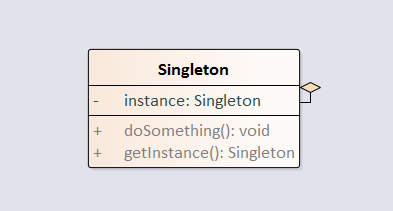单例模式:确保某一个类只有一个实例,并提供全局访问该实例的方法。
uml图如下:

1.饿汉式
1
2
3
4
5
6
7
8
9
10
11
12
13
14
15
16
17
| package com.notejava.singleton.hungry;
public class Singleton {
private static Singleton instance = new Singleton();
private Singleton() {}
public static Singleton getInstance() {
return instance;
}
}
|
2.懒汉式
1
2
3
4
5
6
7
8
9
10
11
12
13
14
15
16
17
18
19
| package com.notejava.singleton.lazy;
public class Singleton {
private static Singleton instance;
private Singleton() {}
public static Singleton getInstance() {
if (instance == null) {
instance = new Singleton();
}
return instance;
}
}
|
3.线程安全的懒汉式
1
2
3
4
5
6
7
8
9
10
11
12
13
14
15
16
17
18
19
| package com.notejava.singleton.secure;
public class Singleton {
private static Singleton instance;
private Singleton() {}
public static synchronized Singleton getInstance() {
if (instance == null) {
instance = new Singleton();
}
return instance;
}
}
|
4.双重检测懒汉式(DCL)
1
2
3
4
5
6
7
8
9
10
11
12
13
14
15
16
17
18
19
20
21
22
23
| package com.notejava.singleton.dcl;
public class Singleton {
private volatile static Singleton instance;
private Singleton() {}
public static Singleton getInstance() {
if (instance == null) {
synchronized (Singleton.class) {
if (instance == null) {
instance = new Singleton();
}
}
}
return instance;
}
}
|
5.内部静态类式
1
2
3
4
5
6
7
8
9
10
11
12
13
14
15
16
17
18
| package com.notejava.singleton.holder;
public class Singleton {
private Singleton() {}
public static Singleton getInstance() {
return SingletonHolder.instance;
}
private static class SingletonHolder {
private static final Singleton instance = new Singleton();
}
}
|
6.容器式
1
2
3
4
5
6
7
8
9
10
11
12
13
14
15
16
17
18
19
20
21
22
23
24
25
| package com.notejava.singleton.manager;
import java.util.HashMap;
import java.util.Map;
public class SingleManager {
private static Map instanceMap = new HashMap();
private SingleManager() {}
public static void register(String key, Object instance) {
if (!instanceMap.containsKey(key)) {
instanceMap.put(key, instance);
}
}
public static Object get(String key) {
return instanceMap.get(key);
}
}
|
